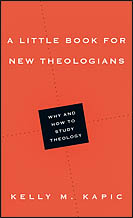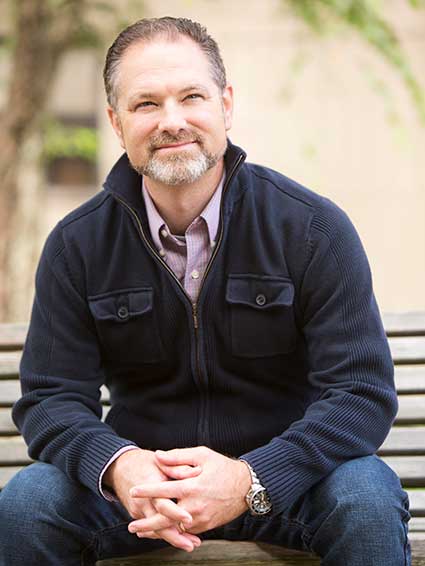Author Interview with Dr. Kelly Kapic (part 2)
Today we continue our discussion with Dr. Kelly Kapic concerning his A Little Book for New Theologians in which he charts a helpful path for theological study. If you missed our conversation yesterday, you can see it here.
Books At a Glance (Fred Zaspel):
How is personal godliness important in doing theology? And what do you mean by “anthroposensitive theology”?
Kelly Kapic:
One of the neglected aspects of the theological task, in my opinion, is the recognition that not only does theology influence our lives, but also our lives influence our theology.
This is partly behind what I mean by advocating for an “anthroposensitive theology.” Forgive me for being technical for a minute, but I define it as a refusal to divorce theological considerations from practical human application, since theological reflections are always interwoven with anthropological concerns. This combination of “anthropo-” (“human”; “relating to human beings”; from Greek anthropos) and “sensitive” is an attempt to avoid an overly simplistic classification of theology as either theocentric (God-centered) or anthropocentric (human-centered).
Clearly our theology must be God-centered, but this language can mask the reality that our theology is, at the same time, concerned with our relation to this God. While other terms such as “pastoral” or “experiential” could be used, these terms often carry either unnecessarily negative connotations or represent a notion of what is done only after theological reflection, as though we work to get our theology correct and then move on to practical concerns. Yet in the complex relationship between life and theology, we should admit that for good or ill our experience and practice not only grow out of our theology but also inform it.
It doesn’t take much for me to convince people that good or bad theology can influence how we live – people are quick to embrace this trickle down theory. But then when I argue that not only does our theology influence our lives, but our lives influence our theology, it is at that point people get nervous. They may agree that ‘liberals’ have allowed ‘cultural forces’ to influence them (e.g., ‘they just think that because they are reflecting radical feminism’ or something like that). But too often we fail to see that this applies to all of us, for good or ill. None of us escape ‘culture,’ and none of us escape the reality that our life experiences influence our theology. Our experiences often make certain things more or less believable (this is similar to an important insight by Wittgenstein). Thus, we need to watch our ‘lives and doctrine’ closely, for they are interwoven in ways we may never fully appreciate.
While much more could be said on that, let me mention one important point.
We often say, ‘my theology is better than my life,’ and I agree that can often be the case. But I have also come to believe that at times, our lives can actually be better than our articulated theology. For example, I know people who speak emphatically against the idea of true divine sovereignty, yet in their lives I witness them call out in confidence to the Lord Almighty, trust him amid uncertainty, and praise him through everything. There are believers who, in my opinion, have an underdeveloped view of the biblical importance of injustice and the poor, yet in their sacrificial lives they actually provide a rich portrait of divine generosity and compassion. In such cases, it seems to me their lives are better than their articulated theology.
So, we are all theologians. We want to be faithful in our theology and our lives, to bring them into harmony as much as possible, yet we also recognize that this side of glory we often experience painful inconsistencies and lingering questions.
 Books At a Glance:
Books At a Glance:
You insist that pure rationality is impossible, that reasoning necessarily begins with faith. What do you mean by this? And what then is the role of faith in doing theology? What do you mean by “faithful reasoning”?
Kelly Kapic:
The Church never ends up in good places when it pits reason against faith. These two are meant to work in harmony, rather than to be put in opposition to one another. Fundamental to my argument is a basic assumption: the Lord of Heaven and Earth created us. To rightly understand God, the world, and our place within it, we must recognize the Creator and his relation to his creation. We now call this faith.
Put differently, faith in the Triune God allows us to have our reason function more in line with its original design of living in communion with God. Reason apart from a recognition of God (c.f., faith) has certain dysfunctions built into it. True faith, rightly understood, does not undermine reason but expands it, opens it up to the vastness and the interconnectedness of all of creation. In this way, our reason works best when it is full of faith – when it is faithful. Faith does not call us to crucify reason, but to resurrect it to true life.
However, sometimes Christians affirm the importance of faith but belittle the value of reason. This is a tragedy and creates a whole different set of problems. Faith apart from reason is often blind, and it can take us into all kinds of dangerous places. For faith to function fully, it must be directed to the triune God who has revealed himself. In this way, God created us with various faculties, including our minds, so that we might love and worship him. Faith does not undermine these faculties, but rather, in light of the fall, faith redirects us back to our Creator and Redeemer who promises to make all things new in the risen Lord.
Books At a Glance:
The point is often stressed — and you make the point very well also — the necessity of prayer in doing theology. Most of us can readily see the sense of this. But just what does this look like in practice? How should we pray when doing theology? And what, exactly, is “an attitude of prayer”? Can you offer us some specific instruction as to what “prayerful study” looks like in practice?
Kelly Kapic:
I don’t want to make this overly complicated here. Let me make this as simple as I can. When we do theology, we do it before, with, and under God – this is prayerful theology at its heart. Prayerful theology is an attempt to bridge the worlds we affirm on our knees with the worlds we affirm as we stand up and speak, think and live.
It is all too easy for us to create divisions in our life, so that there are acts of piety, including prayer, and then there are intellectual acts, such as theological reflection. Part of the challenge is bringing these worlds together, fostering a more holistic approach.
Sometimes I can tell my students are falling into this problem when they appear to be creating a chasm between honestly wrestling with philosophical and theological ideas in class and the piety they are seeking outside of class. It is as if they should feel guilty about giving careful attention to theological nuance. As if God is somehow gets nervous or upset by the time devoted to such details and difficult questions. Such persistent anti-intellectualism and misunderstandings remain common among those of us with whom the lingering scent of frightened fundamentalism is not easily discarded.
The best way I know to combat such growing divisions is to bring prayer and study together. Encourage students to pray before they start reading an academic treatise, or end times of philosophical debate by singing the doxology (even if only silently in their hearts). These are a few ways to fight the temptation to pit study against prayer, and piety against thought.
Books At a Glance:
Your emphasis on humility and repentance in doing theology seems to strike a note we might too easily miss. How is pride an interference to theological study? And what then is the role of humility and repentance?
Kelly Kapic:
I have already given a basic response to this in my comments about the fear of the Lord. Let me just add this: God opposes the proud but gives grace to the humble. This relates to our theology. None of us are perfect, and none of us have a perfect theology. Thus, repentance must be part of the warp and woof of our lives, including our theological reflections. We inevitably will come to recognize ways we have misunderstood God and his word, ways our thinking and living has fallen short. Repentance is appropriate as a response. Rather than being depressing, repentance is meant to point us to liberating and joyful fresh starts. Forgiven in Christ, we hopefully grow in our understanding and love of God. Furthermore, humility is an intellectual virtue – it allows us to be curious, to has questions, to wonder, to delight, and to grow in our knowledge. Apart from dispositional humility intellectual integrity and growth are almost impossible.
I should give one qualification, however. I do think we occasionally confuse our finitude with sin. Sometimes we don’t understand because of our finitude, and we do not need to repent of being finite. We are not God and not promised to become God. Yet, beyond our finitude, our sin (intellectual and otherwise) can distort our theology, and when we come to recognize problems we should humbly repent and turn to God, thankful for his grace and confident in his faithfulness, even when we are faithless.
Editor:
Click here to see the concluding portion of our interview with Dr. Kapic here at Books At a Glance.
Buy the books

A LITTLE BOOK FOR NEW THEOLOGIANS
